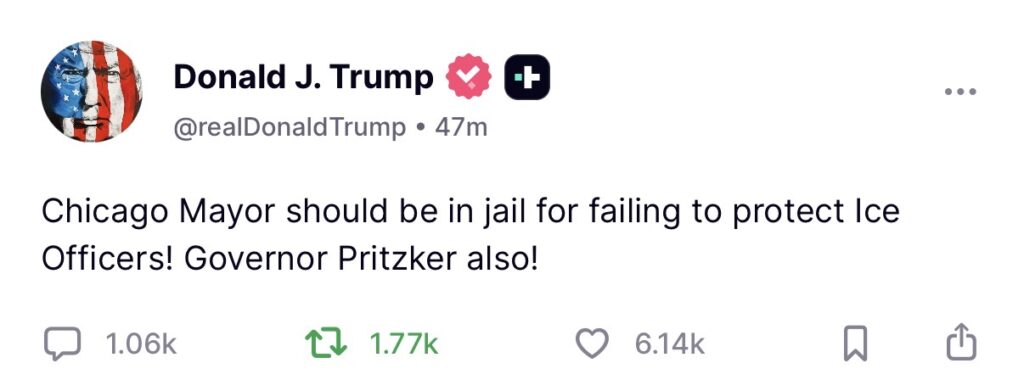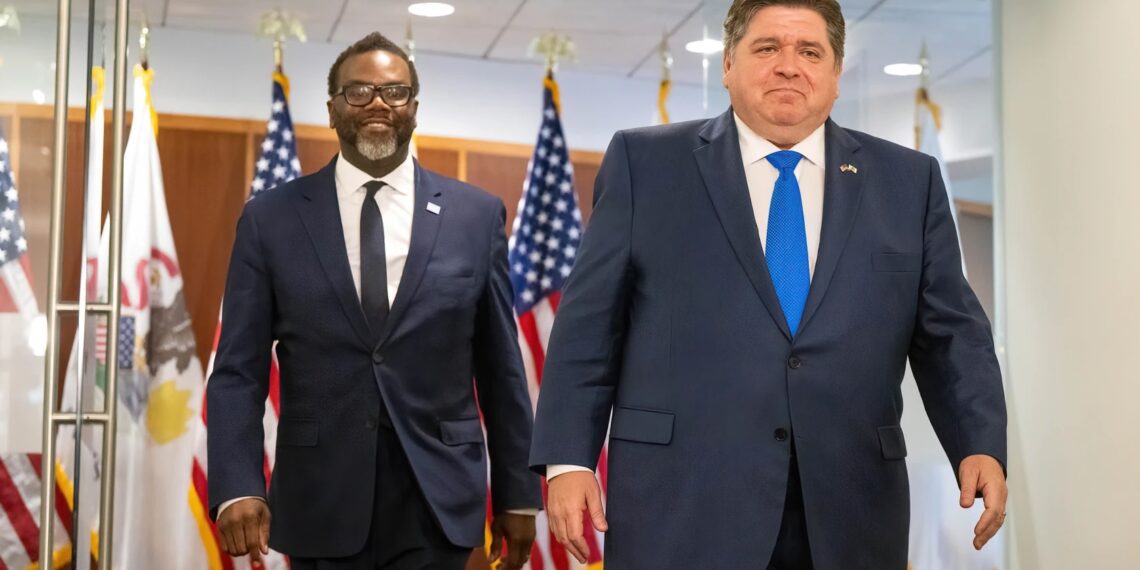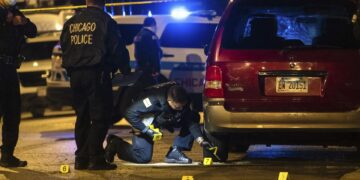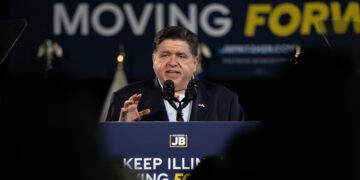By Illinois Review
President Donald Trump blasted Illinois Gov. JB Pritzker and Chicago Mayor Brandon Johnson on Wednesday morning, declaring that both “should be in jail” for issuing executive orders that prohibit local police from helping federal immigration officers. The President accused them of obstructing federal law, endangering U.S. Immigration and Customs Enforcement (ICE) agents, and violating multiple federal statutes designed to protect law enforcement officers.
“Chicago Mayor should be in jail for failing to protect Ice Officers!,” President Trump wrote on Truth Social. “Governor Pritzker also!”

The President’s comments come after reports that Chicago police officers were ordered to “stand down” as ICE agents faced a hostile crowd in Brighton Park. According to CWB Chicago, one ICE agent urgently radioed for backup, warning that he was being surrounded. Instead of authorizing assistance, Chicago Police Department leadership allegedly ordered city officers to retreat from the area entirely – leaving federal agents to fend for themselves.
At issue are the executive orders and state laws signed by both Democratic leaders that bar cooperation between local police and federal immigration authorities. In 2021, Gov. Pritzker signed the “Illinois Way Forward Act,” a law that bans state and local law enforcement from working with ICE or honoring federal detainer requests. The law also requires the closure of local ICE detention centers and forbids local governments from entering into contracts with the federal government to hold immigration detainees.
A few days ago, Mayor Johnson went even further, signing an executive order that designates parts of Chicago as “ICE-Free Zones.” The order bars city police from sharing information with federal immigration officers or assisting in arrests involving illegal aliens. Johnson said the policy was intended to “protect immigrant communities,” but critics say it blatantly defies federal law.
Many legal experts agree that these executive orders violate several federal statutes. Under 8 U.S. Code § 1324, it is a felony to “conceal, harbor, or shield from detection” an individual known to be in the country illegally. Anyone – whether a private citizen or an elected official – who “aids or abets” such actions can face up to five years in prison, or more if the offense involves violence or results in injury.
Further, 8 U.S. Code § 1373 prohibits local governments from restricting communication between local law enforcement and federal immigration authorities. Sanctuary city and sanctuary state policies like those in Illinois directly conflict with this federal law by preventing local officers from sharing immigration information with ICE.
Additionally, attorneys point out that 18 U.S. Code § 111 makes it a crime to “forcibly assault, resist, oppose, impede, intimidate, or interfere” with federal officers engaged in their duties – punishable by up to eight years in prison if an officer is injured. 18 U.S. Code § 1505 criminalizes obstruction of federal proceedings or investigations, carrying a penalty of up to five years.
If an ordinary citizen helped an illegal alien evade arrest or interfered with an ICE officer, they’d be charged with obstruction and harboring.
Under Illinois’ sanctuary state law, officers are not allowed to assist ICE in detaining or deporting individuals who are in the country illegally – even if those individuals are violent offenders or previously deported felons. Critics say the policy creates safe havens for criminal aliens and undermines the rule of law.
The President’s Truth Social post reflects growing frustration among voters nationwide over Democratic sanctuary policies. Polls show that a majority of Americans oppose these measures, believing they put illegal immigrants ahead of citizens and law enforcement.
Under federal law, any individual found guilty of obstructing or impeding a federal officer can face prison time, fines, or both. Aiding or harboring illegal aliens carries a mandatory prison sentence, and if the act results in injury or death, the penalty can be life imprisonment.
For many Illinois residents, the President’s words reflect the frustration of living under leadership that prioritizes illegal immigrants over public safety. As the violence, crime, and lawlessness in Chicago continue to escalate, the question now is whether the law will finally catch up with the politicians responsible for it.









